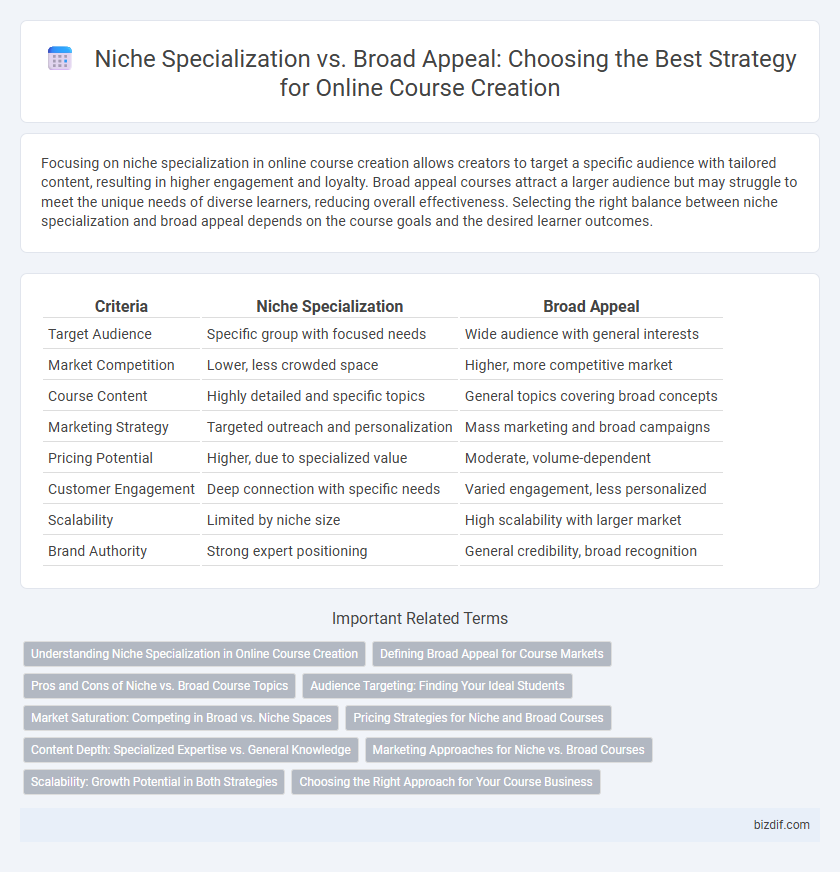Focusing on niche specialization in online course creation allows creators to target a specific audience with tailored content, resulting in higher engagement and loyalty. Broad appeal courses attract a larger audience but may struggle to meet the unique needs of diverse learners, reducing overall effectiveness. Selecting the right balance between niche specialization and broad appeal depends on the course goals and the desired learner outcomes.
Table of Comparison
| Criteria | Niche Specialization | Broad Appeal |
|---|---|---|
| Target Audience | Specific group with focused needs | Wide audience with general interests |
| Market Competition | Lower, less crowded space | Higher, more competitive market |
| Course Content | Highly detailed and specific topics | General topics covering broad concepts |
| Marketing Strategy | Targeted outreach and personalization | Mass marketing and broad campaigns |
| Pricing Potential | Higher, due to specialized value | Moderate, volume-dependent |
| Customer Engagement | Deep connection with specific needs | Varied engagement, less personalized |
| Scalability | Limited by niche size | High scalability with larger market |
| Brand Authority | Strong expert positioning | General credibility, broad recognition |
Understanding Niche Specialization in Online Course Creation
Niche specialization in online course creation targets a specific audience with tailored content, increasing relevance and engagement for learners seeking expertise in that area. Courses focusing on specialized topics often experience higher conversion rates and loyalty due to addressing precise pain points and interests. Leveraging niche markets allows creators to differentiate from broad-appeal competitors by positioning themselves as authoritative experts within distinct fields.
Defining Broad Appeal for Course Markets
Broad appeal in course markets targets a wide audience by addressing universal skills or knowledge areas such as communication, leadership, or digital literacy. Courses designed for broad appeal often emphasize practical applications and foundational concepts that attract learners from diverse backgrounds and industries. This approach maximizes enrollment potential by catering to common market demands and ongoing professional development needs.
Pros and Cons of Niche vs. Broad Course Topics
Niche specialization in online course creation attracts highly targeted learners, enhancing engagement and completion rates while facing limitations in audience size and scalability. Broad appeal courses reach a larger, more diverse audience, increasing potential revenue but often suffering from lower completion rates and less personalized content. Choosing between niche and broad topics depends on balancing audience specificity with market reach to optimize course effectiveness and profitability.
Audience Targeting: Finding Your Ideal Students
Niche specialization in online course creation allows educators to target a specific audience with tailored content that meets precise needs, increasing engagement and conversion rates. Broad appeal courses attract a larger, diverse student base but often struggle with personalization and relevance, impacting overall satisfaction and completion rates. Effective audience targeting involves analyzing learner demographics and preferences to identify an ideal student profile, ensuring the course content aligns perfectly with their goals and challenges.
Market Saturation: Competing in Broad vs. Niche Spaces
Niche specialization in online course creation reduces market saturation by targeting specific learner needs, fostering a dedicated audience with less direct competition. Broad appeal courses face higher competition due to a wider market but benefit from greater potential enrollment volume. Choosing a niche allows creators to position themselves as experts and attract motivated students seeking focused expertise.
Pricing Strategies for Niche and Broad Courses
Niche specialization courses can command higher prices due to targeted content that meets specific audience needs, often leading to better perceived value and less direct competition. Broad appeal courses typically require competitive pricing strategies to attract a larger audience, often benefiting from economies of scale but facing price sensitivity. Implementing tiered pricing or subscription models can balance revenue optimization for both niche and broad-course offerings.
Content Depth: Specialized Expertise vs. General Knowledge
Niche specialization in online course creation delivers in-depth expertise, attracting learners seeking targeted skills and advanced knowledge in specific fields like digital marketing or data science. Broad appeal courses cover general knowledge across multiple topics, appealing to beginners or those exploring diverse interests but often lack the detailed insights of specialized classes. Focusing on content depth through niche specialization enhances course value, student engagement, and perceived authority, driving higher completion rates and positive reviews.
Marketing Approaches for Niche vs. Broad Courses
Niche specialization in online course creation leverages targeted marketing strategies such as SEO-focused content, community engagement in specific forums, and tailored email campaigns to attract highly interested audiences. Broad appeal courses benefit from diverse advertising channels, including social media ads, influencer partnerships, and large-scale content marketing to reach a wide demographic. Data shows niche courses often achieve higher conversion rates due to precise targeting, whereas broad courses rely on volume for scalability.
Scalability: Growth Potential in Both Strategies
Niche specialization offers higher scalability through targeted audiences willing to pay premium prices, resulting in greater customer loyalty and reduced competition. Broad appeal strategies maximize growth potential by attracting a larger, diverse user base, enabling rapid enrollment increases and varied revenue streams. Balancing niche focus with scalable marketing tactics can optimize long-term growth in online course creation.
Choosing the Right Approach for Your Course Business
Niche specialization in online course creation targets a specific audience, enhancing course relevance and increasing student engagement, which often leads to higher conversion rates. Broad appeal courses attract a larger audience but may face more competition and lower completion rates due to less tailored content. Evaluating market demand, competition, and your expertise helps determine whether a focused niche or a broad approach aligns best with your course business goals.
Niche specialization vs Broad appeal Infographic

 bizdif.com
bizdif.com